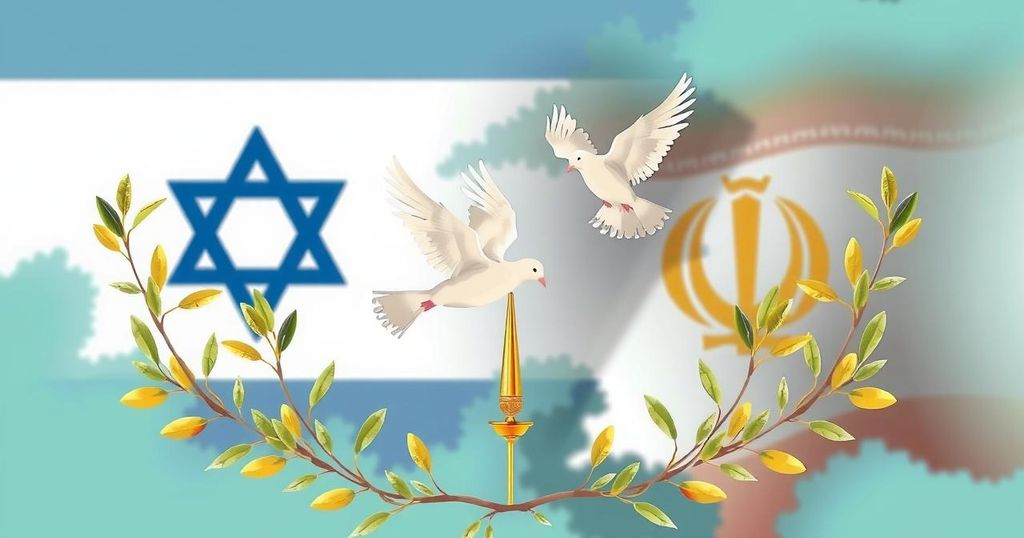Trump Issues Warning to Iran, Predicts Deal with Israel May Come Soon
Trump warns Iran against retaliation while suggesting a potential peace deal with Israel is imminent. He emphasizes strength in response to attacks. Influential supporters push for non-involvement in foreign conflicts, complicating his diplomatic narrative. Upcoming G7 talks will spotlight the Middle East crisis.
Former President Donald Trump issued a firm warning to Iran on Sunday, indicating that any retaliation against U.S. interests in the Middle East would prompt a massive military response. At the same time, he expressed optimism that Israel and Iran could reach a deal to resolve their ongoing tensions soon. In a social media post, Trump claimed the U.S. had no role in the recent attacks that have seen missiles exchanged between Israel and Iran for three consecutive days.
Amidst the escalating conflict, which has seen Israel targeting Iranian military sites—allegedly linked to its nuclear program—Iran retaliated with missile strikes deep into Israeli territory. Trump underscored that any attack on the U.S. would face unprecedented repercussions: “If we are attacked in any way, shape or form by Iran, the full strength and might of the U.S. Armed Forces will come down on you at levels never seen before.”
After this stern warning, he took to social media again to suggest that a peace deal between Iran and Israel is on the horizon. Trump referenced his past successes in de-escalating international conflicts, notably between India and Pakistan, and expressed confidence that similar results could be achieved in the Middle East. He emphasized, “Iran and Israel should make a deal, and will make a deal.”
Trump’s comments followed a tense confrontation where Pakistan and India experienced significant military exchanges after a tragic attack by militants in Kashmir. His administration had previously brokered a ceasefire between the two powers, a feat he claimed credit for despite disputes from Indian officials.
The former U.S. president reiterated his diplomatic efforts during his first term, citing attempts to mediate disputes between various nations like Serbia and Kosovo and Egypt and Ethiopia. He expressed a hopeful view for future peace, insisting that diplomatic efforts are underway: “Likewise, we will have PEACE, soon, between Israel and Iran!” This statement encapsulated Trump’s ongoing ambition to reshape the foreign policy narrative.
The current situation strains Trump’s policy promises. He advocated for a swift end to wars and claimed a non-interventionist stance on foreign conflicts. Nonetheless, he faces pressure as the discourse around the escalating crisis intensifies. Following critics of President Joe Biden regarding military action against Iranian sites, Trump found himself encouraging Israel to consider negotiations instead.
In 2015, the U.S. and European nations negotiated an agreement limiting Iran’s nuclear ambitions, a pact Trump later sought to dismantle. Bringing Iran back to the negotiation table will be a significant challenge, as evidenced by recent escalating tensions.
On Saturday, Trump spoke with Russian President Vladimir Putin regarding the conflict. Later on Sunday, Trump is scheduled to attend the G7 leaders summit in Canada, where the escalating tensions in the Middle East will be a focal point, potentially overshadowing other global discussions.
Several influential Trump supporters are advocating against U.S. involvement in the crisis. Figures such as Rep. Marjorie Taylor Greene and Turning Point USA founder Charlie Kirk remind Trump of why voters supported him, asserting that intervention could jeopardize his administration’s broader objectives. Kirk recently expressed concerns about potential divide within his supporters over foreign military engagement. Meanwhile, Sen. Rand Paul voiced hope that Trump’s instincts to refrain from conflict would guide his decisions, expressing skepticism about achieving a negotiated peace in these turbulent times.
Trump’s balancing act among supporters, critics, and international pressures lays a dramatic backdrop as he navigates an increasingly complex geopolitical landscape.
In summary, President Trump has warned Iran against retaliating against U.S. interests while predicting that Israel and Iran may soon reach a deal to end hostilities. His dual approach seeks to project strength while advocating for diplomatic solutions to conflict. With significant pressures within his base to avoid foreign entanglements, the former president’s handling of the escalating tensions in the Middle East will be closely monitored as he prepares for international discussions at the G7 summit.
Original Source: apnews.com




Post Comment